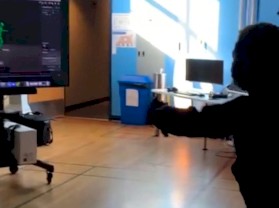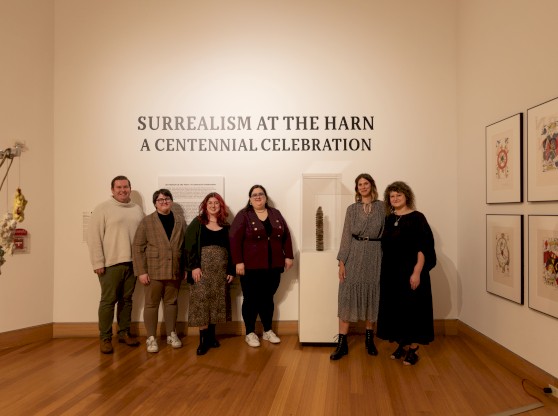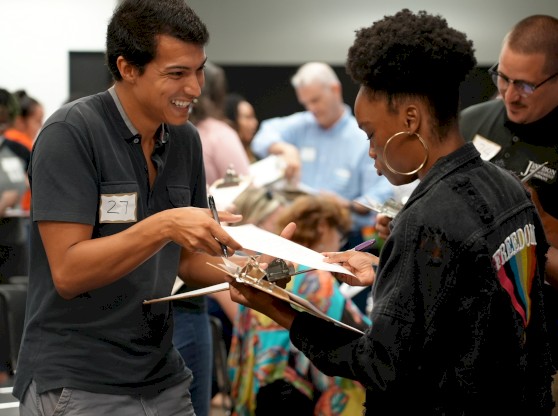In this interview, Mallory Scottow, a first-year Sculpture MFA candidate, conducts an interview with Mariana Baquero, a second-year Ceramics MFA candidate. Mariana discusses her career switch from lawyer to artist and how her past experience affects her artistic process.
Mallory: You went to school for law and went to work for a firm. At what point did you know that it wasn't for you, and why?
Mariana: It was a gradual process of realizing that I wasn't happy practicing law. In the beginning, I was immersed in the learning process, figuring out how to be a professional and navigating the politics of working in a law firm. But as I got the hang of the job, I realized that the work didn't satisfy me. I didn't enjoy the interactions with the people around me. My priorities were different than theirs. We cared about different things. I could imagine a different life, one where I had more meaningful interactions with people. At the time, I wasn't sure what forms those interactions would take, but I knew that I needed something different.
Mallory: Does your background in law affect your art and art practice? Your process?
Mariana: Law school is surprisingly good training for ceramics! Not that I would recommend all ceramic artists go to law school. But I did learn some really good problem-solving skills from my time as a lawyer. Lawyers are trained to spot issues and come up with solutions, and I found that skill translated really well to ceramics. Both law and clay require careful attention to process. Both require careful attention to detail. I don't think my background in law has necessarily affected the content of my work, by it certainly has affected my process. And my experiences as a lawyer also make me really appreciate being part of the artistic community.
Mallory: When I pick up a bowl of yours, maybe a cup, what are some key things that you want me, as a viewer, to possibly understand or gather from your work?
Mariana: I'm more interested in invoking a feeling in the people who interact with my pots. With my forms and surfaces, I aim to create a sense of intrigue and curiosity. I want people to feel a pull, a need to touch. Maybe it is the soft, buttery surface. Or maybe they recognized a word or image that triggers a memory. I want people to get a clear sense that the piece is handmade when they pick it up.
Mallory: At any point do you feel that you are making work just to make work, or is there a higher purpose?
Mariana: Oh, there is definitely a higher purpose in making the work that I make. The objects I make are part of our material culture. The objects that surround us on a daily basis are not merely passive receptacles of meaning. Culture is created in lived-through objects. An object’s very materiality—its size, shape, function, decoration—plays a role in shaping and creating human relationships, identities and experiences. Objects act on people, and are acted on by people, for the purpose of carrying out social functions, regulating social relationships and giving symbolic meaning to human activity. Objects also act as mirrors, helping us to create our own identities and at the same time learn about ourselves as individuals.
I make objects that are used for eating and drinking. Most people eat and drink out of industrially-produced objects, so when someone chooses to eat or drink out of a handmade object, it is a deliberate choice. People who buy my work are looking for connection and meaning. Owning a handmade pot reflects an aspect of their identity that is important to them.
Mallory: Where do you see yourself in five years?
Mariana: Ideally, I would like to combine a studio practice with teaching. Making work will always be a necessary component of what I do. But I don't see myself working exclusive in my studio. I enjoy teaching a great deal. It's such a privilege to be part of that moment when someone develops a hard-earned skill and learns to think about themselves in a new way. As for what form the teaching will take, I'm not completely sure. Perhaps a combination of workshops and college teaching. I really enjoy the workshop environment, it is low pressure and congenial. On the other hand, I also enjoy working in an academic setting, helping people prepare for a career in ceramics.
Mallory: We have discussed the role of "greatness" and "mediocrity." Will you explain your opinion in general to how that affects how you see art and art makers?
Mariana: I guess I don't really see the value in labels like "greatness" and "mediocrity" at least from the point of view of a maker. Who decides those labels anyway? Of course, it's important to me that I make the best work I'm capable of making, both in terms of craftsmanship and concept. But not all art can be "great" in terms of fame and fortune and that's totally OK with me. An ordinary person can go to a museum to see a Picasso. And viewing a Picasso can be a moving, transcendent experience. There is value in viewing great art. But that is not all that art is. Art is also the watercolor that you buy at a craft fair because the colors make you happy. It is the exquisitely crafted handmade bowl that you eat your cereal out of because you feel a connection to its maker each time you use it. In my mind, each of those experiences has just as much value as the experience of viewing a Picasso. All of those experiences are a necessary part of the human experience.



